Nine years living in this beautiful city and I’m qualified to say: there’s no better place to read in Baltimore than beside the bay window at the end of the bar in Mt. Royal Tavern. They call it the Dirt Church because it’s a dank dive with a ceiling painted like the Sistine Chapel. The pours are holy, alright. One of the daytime regulars wears a mask at all times except for when she’s sipping, which reminds me of people on oxygen who still smoke cigarettes. It’s the kind of place where you really get Ray Midge’s beer protocols in Charles Portis’s Dog of the South: “I drank from the side of the mug that a left-handed person would use, in the belief that fewer mouths had been on that side.”
But, the light of that bay window! The way you can’t really see the TV from that end of the bar! The fact that its three stools are so close to the door that most people don’t even think about sitting in them! These elements create a perfect perch for reading. This and another fact struck me last summer. I was killing time before my friend Joel arrived, taking a break from Nick Drnaso’s Acting Class, when I wondered, “How many books have I read this year by writers whose names start with D?” The mind can surprise itself.
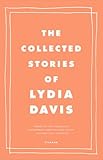 I thought about it. By then, I was almost finished with my yearslong journey through Lydia Davis’s Collected Stories, which I chipped through a story or two at a time. Dates have been hazy for the duration of the plague, and my happenstance pace through Davis’s mini fictions felt impossible. Still, it was true. I was on track to read two “D” authors by year’s end: Davis and Drnaso.
I thought about it. By then, I was almost finished with my yearslong journey through Lydia Davis’s Collected Stories, which I chipped through a story or two at a time. Dates have been hazy for the duration of the plague, and my happenstance pace through Davis’s mini fictions felt impossible. Still, it was true. I was on track to read two “D” authors by year’s end: Davis and Drnaso.
What about the other letters of the alphabet? I opened Goodreads.
 Unintentionally, by August I had read books by authors representing 20 of the 26 letters in the alphabet. I had even managed to cross the elusive “Q” off the list when I read Raymond Queneau’s We Always Treat Women Too Well one month prior. (“The Irish mind, as we know, does not obey the rules of Cartesian logic, any more than it obeys those of experimental method,” Queaneau wrote. “It proceeds by ‘intuition.’”)
Unintentionally, by August I had read books by authors representing 20 of the 26 letters in the alphabet. I had even managed to cross the elusive “Q” off the list when I read Raymond Queneau’s We Always Treat Women Too Well one month prior. (“The Irish mind, as we know, does not obey the rules of Cartesian logic, any more than it obeys those of experimental method,” Queaneau wrote. “It proceeds by ‘intuition.’”)
In fact, I had read a chunk of Queneau’s pulpy bank heist in the worst possible venue: my local lesbian bar, which I like because they serve Hamm’s for cheap. Obviously everyone knows you’re not supposed to judge books by their covers, but still I kept its title hidden like a school bus driver reading Lolita. You don’t want people to get the wrong idea.

 Twenty of 26 was enough progress that I resolved to finish the job, and lord help me, I am a finisher. I scanned for holes. I needed books by authors whose last names began with “E,” “J,” “K,” “N,” and, intimidatingly, both “X” and “Z.” Go figure that aside from “Q,” I’d already covered the notoriously tough “U” and “V” by plowing through the first three volumes of Naoki Urasawa’s 20th Century Boys, and finally getting around a couple years late to Ocean Vuong’s Night Sky with Exit Wounds.
Twenty of 26 was enough progress that I resolved to finish the job, and lord help me, I am a finisher. I scanned for holes. I needed books by authors whose last names began with “E,” “J,” “K,” “N,” and, intimidatingly, both “X” and “Z.” Go figure that aside from “Q,” I’d already covered the notoriously tough “U” and “V” by plowing through the first three volumes of Naoki Urasawa’s 20th Century Boys, and finally getting around a couple years late to Ocean Vuong’s Night Sky with Exit Wounds.


 “E” was easy enough. It was actually the highlight. I love Brian Evenson’s scary stories, and “Myling Kommer” in The Glassy, Burning Floor of Hell was like an espresso-strength version of Hereditary. I love Percival Everett, and The Trees was one of the top-5 books I read this year. I was blown away by If I Survive You, the debut novel-in-stories by Jonathan Escoffery, who was new to me, and who’s now earned a place high in the ranks of my own personal Florida canon.
“E” was easy enough. It was actually the highlight. I love Brian Evenson’s scary stories, and “Myling Kommer” in The Glassy, Burning Floor of Hell was like an espresso-strength version of Hereditary. I love Percival Everett, and The Trees was one of the top-5 books I read this year. I was blown away by If I Survive You, the debut novel-in-stories by Jonathan Escoffery, who was new to me, and who’s now earned a place high in the ranks of my own personal Florida canon.

 Judy Jordan’s wondrous Carolina Ghost Woods was the first title by a “J” author I read this year, but I padded the stats with Lawrence Jackson’s Shelter, a book at least partially about my neighborhood in Baltimore. At my local, the Swallow at the Hollow, I talked so much about Jackson’s work that a bartender and another patron each purchased copies on their phones.
Judy Jordan’s wondrous Carolina Ghost Woods was the first title by a “J” author I read this year, but I padded the stats with Lawrence Jackson’s Shelter, a book at least partially about my neighborhood in Baltimore. At my local, the Swallow at the Hollow, I talked so much about Jackson’s work that a bartender and another patron each purchased copies on their phones.

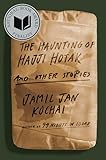 I struggled with “K” because the first two books I picked were not quick reads. One was about GoldenEye for N64, and it was fun but long, while the other was Val Kilmer’s poetry collection, and the less I say about it, the better. Fortunately, I made my way to Jamil Jan Kochai’s debut collection The Haunting of Hajji Hotak. Talk about an opener. And later on, the titular story? A reimagination of a haunted house set within the surveillance state of our Forever War
I struggled with “K” because the first two books I picked were not quick reads. One was about GoldenEye for N64, and it was fun but long, while the other was Val Kilmer’s poetry collection, and the less I say about it, the better. Fortunately, I made my way to Jamil Jan Kochai’s debut collection The Haunting of Hajji Hotak. Talk about an opener. And later on, the titular story? A reimagination of a haunted house set within the surveillance state of our Forever War era? I will never forget it.
era? I will never forget it.
 The funny thing about this alphabetical quest is it uncovered some surprises. There are fewer authors with last names beginning with “N” than you might think. I wound up cheating a little with Amsterdam Stories, a collection by a pseudonymous Dutch writer who went only by Nescio. It occurred to me while reading “Little Poet” that people don’t write as many stories about meeting the devil as they used to. Gogol did it, AC/DC did it, but what’s your most current example?
The funny thing about this alphabetical quest is it uncovered some surprises. There are fewer authors with last names beginning with “N” than you might think. I wound up cheating a little with Amsterdam Stories, a collection by a pseudonymous Dutch writer who went only by Nescio. It occurred to me while reading “Little Poet” that people don’t write as many stories about meeting the devil as they used to. Gogol did it, AC/DC did it, but what’s your most current example?

 At last I came to “X” and “Z,” and for both I read new-to-me living writers from China. This, really, was what propelled me through the alphabet: I am sucker for reading challenges that pull me out of my comfort zone. Why read the books on my shelf when I can bring new ones home? On Twitter, someone recommended Gao Xingjian’s Buying a Fishing Rod for My Grandfather, and I’m glad they did. Xingjian’s stories are about a lot of near disasters and one near-escape: a man almost drowns with a muscle cramp, past lovers almost risk it all, a father gets struck by a car, etc. The tension comes from what’s possible, not necessarily what happens. For “Z,” I picked up Deep Vellum’s edition of Zhu Zhu’s The Wild Great Wall, and it was a revelation. (So was the shirt I got in the same order.)
At last I came to “X” and “Z,” and for both I read new-to-me living writers from China. This, really, was what propelled me through the alphabet: I am sucker for reading challenges that pull me out of my comfort zone. Why read the books on my shelf when I can bring new ones home? On Twitter, someone recommended Gao Xingjian’s Buying a Fishing Rod for My Grandfather, and I’m glad they did. Xingjian’s stories are about a lot of near disasters and one near-escape: a man almost drowns with a muscle cramp, past lovers almost risk it all, a father gets struck by a car, etc. The tension comes from what’s possible, not necessarily what happens. For “Z,” I picked up Deep Vellum’s edition of Zhu Zhu’s The Wild Great Wall, and it was a revelation. (So was the shirt I got in the same order.)
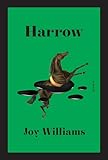





 Taking measure of the year, and aside from letters, I recall certain books for lines that rattled around in my head. I’ll never know the answer to Joy Williams’s question in Harrow’s prologue: “Have you ever seen anything stiller than a ham?” To Ruth Stone asking, “Am I among the jellyfish of your griefs?“ Once a week, I think about how in Someone Else’s Wedding Vows her granddaughter, Bianca Stone, wrote “I’m down at the local bar,/ sheathing famous drinks into myself—.” I think of how the speaker in Sara Moore Wagner’s Hillbilly Madonna referred to her father as a “dying lemon.” How Caylin Capra-Thomas used “Godzilla” as a verb in Iguana Iguana. Is it possible to forget Dean Young’s line in Embryoyo about how, “Some things can’t be bought,/ they can only be paid for?” (Is it possible to reread that line in a voice that isn’t Anton Chigurh’s?) I’ll write my entire life without topping Alfred Hayes’s description of disarrayed laundry in My Face for the World to See: “the sad mardi gras of her own clothes discarded on the floor.” My New Jersey spirit stirs when I remember the way Fernanda Melchor described a character in Paradais as “round as a ball and with a face like a slapped ass.”
Taking measure of the year, and aside from letters, I recall certain books for lines that rattled around in my head. I’ll never know the answer to Joy Williams’s question in Harrow’s prologue: “Have you ever seen anything stiller than a ham?” To Ruth Stone asking, “Am I among the jellyfish of your griefs?“ Once a week, I think about how in Someone Else’s Wedding Vows her granddaughter, Bianca Stone, wrote “I’m down at the local bar,/ sheathing famous drinks into myself—.” I think of how the speaker in Sara Moore Wagner’s Hillbilly Madonna referred to her father as a “dying lemon.” How Caylin Capra-Thomas used “Godzilla” as a verb in Iguana Iguana. Is it possible to forget Dean Young’s line in Embryoyo about how, “Some things can’t be bought,/ they can only be paid for?” (Is it possible to reread that line in a voice that isn’t Anton Chigurh’s?) I’ll write my entire life without topping Alfred Hayes’s description of disarrayed laundry in My Face for the World to See: “the sad mardi gras of her own clothes discarded on the floor.” My New Jersey spirit stirs when I remember the way Fernanda Melchor described a character in Paradais as “round as a ball and with a face like a slapped ass.”

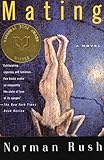
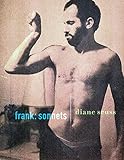 I also recall the rest of the books that round out my top five of the year (aside from Everett’s aforementioned The Trees):
I also recall the rest of the books that round out my top five of the year (aside from Everett’s aforementioned The Trees):
- Nightbitch by Rachel Yoder: The best book on motherhood I’ve read, but it’s about more than just that. When it sang loudest, it reminded me of Serial Mom in the best way.
- Mating by Norman Rush: Reading the first section of this book on my porch was one of the signal reading experiences of my life. How proud that would make Nelson: “He would say only slightly facetiously that the main effort of arranging your life should be to progressively reduce the amount of time required to decently maintain yourself so that you can have all the time you want for reading.”
- Waterproof: Evidence of a Miami Worth Remembering edited by Mario Alejandro Ariza: “I don’t want to die for them to miss me,” Drake sang in “God’s Plan,” and maybe he was talking about this gorgeous anthology of eulogies for places that mean something. (He filmed that video in Miami, by the way.) Every city should have something like this—a wake for the still living—because although Miami will submerge first, it won’t submerge last. Whether any other city could have something like this is another story, and I’m biased.
- frank: sonnets by Diane Seuss: “Poems are someone else’s clothes I slipped/ into so I could skip town,” and I’m guilty as all hell.
Now I write with 26 of 26 letters accounted for, and many with multiple entries. I’m glad to have completed the challenge, but I won’t repeat it this year. I need a new one. I just know that sooner than later I’ll be back by that bay window reading something or other, headed somewhere.
The post A Year in Reading: Nick Moran appeared first on The Millions.
Source : A Year in Reading: Nick Moran










